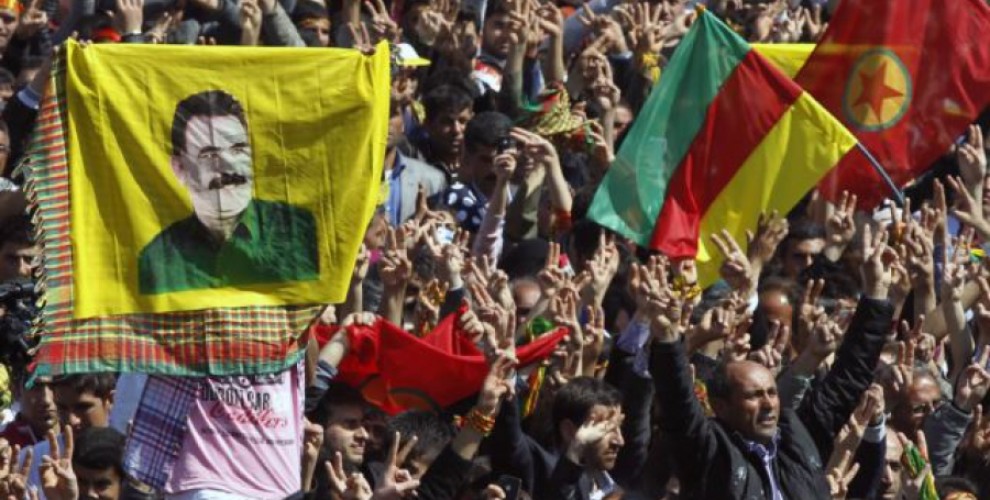Debbie Bookchin writes on her father and Öcalan
In a long article Murray Bookchin’s daughter recalls how the two thinkers got to ‘know’ each other.
In a long article Murray Bookchin’s daughter recalls how the two thinkers got to ‘know’ each other.

“Had my father lived to see his ideas enacted in Rojava and southeastern Turkey, he would have been profoundly moved to know that his revolutionary spirit had been reborn among a generation of the Kurdish people. He would have taken heart that Rojava was one more historical instance of the desire for freedom that he himself felt so deeply and to which he dedicated his life”.
Thus ends an article by Debbie Bookchin, daughter of historian and philosopher Murray Bookchin, published on Friday in the New York Review of Books.
Debbie Boockchin recalls in a moving and political piece, how her father in 2004 at the age of 83 met the PKK and the Kurdish Liberation Movement.
She reminds how Bookchin had unexpectedly received in April 2004 a letter from an intermediary writing on behalf of the jailed Kurdish activist Abdullah Öcalan, head of the Kurdistan Workers’ Party (PKK).
The intermediary added that Öcalan had read all of Bookchin’s books available in translation and considered himself a “good student” of his.
“During the course of this work [preparing his defense], Öcalan - writes Debbie Bookchin - was influenced by a number of thinkers, including Ferdinand Braudel, Immanuel Wallerstein, Maria Mies, and Michel Foucault. In addition, Öcalan had listened to, and nurtured, the voices of a generation of Kurdish women led by Sakine Cansiz, a PKK co-founder and a legendary figure who survived years of unspeakable torture in Turkish prisons in the 1980s and was encouraged by Öcalan to write her memoirs. (Cansiz was assassinated by a Turkish agent in Paris in 2013, along with two other Kurdish female activists)”.
Bookchin adds that “many of the defining features of the political philosophy that Öcalan began to espouse in the 2000s are firmly rooted on my father’s idea of social ecology and its political practice: ‘libertarian municipalism’ or ‘Communalism’. My father saw ecological problems as inherently social problems—of hierarchy and domination—that had to be solved in order to address the environmental crisis”.
This social theory of Bookchin’s, absorbed and amplified by Öcalan under the name “democratic confederalism,” is now guiding millions of Kurds in their quest to build a non-hierarchical society and local council-based democracy.
Bookchin continues: “As the Syrian civil war enters its eighth year, most Westerners are familiar with images of the Kalashnikov-toting men and women of the Kurdish People’s Protection Units, known respectively as the YPG, which is mostly male, and the YPJ, the all-female units. These militias have fought and died by the thousands across the battlefields of Syria as the leading units of the Syrian Democratic Forces (SDF), the multi-ethnic force supported by the United States in the campaign against ISIS”.
Less often acknowledged, she adds “is what they are fighting for: the chance to achieve not only political self-determination but also a new form of direct democracy in which every member of the community has an equal say in the popular assemblies that address the issues of their neighborhoods and towns—that is, democracy without a central state”.
Debbie Bookchin writes about the experience of Rojava and then goes back to her father’s own studies and how the family was deeply immersed in social and political activity, “It’s very difficult to give you any idea of the extent to which almost every day one felt something new, [that] something politically exciting and in a sense dangerous was happening. For example, we had continuous street corner meetings and I would go from one street corner meeting with my friends to another”.
Writing about how her father’s work was reinterpreted and adapted to the Kurdish question by Öcalan, Debbie Bookchin says, “My father’s emphasis on hierarchy became a signature aspect of Öcalan’s efforts to redefine the Kurdish problem. In The Roots of Civilization, Öcalan’s first published volume of prison writings, he, too, traced the history of early communitarian societies and the transition to capitalism. Like Bookchin, he celebrated the formation of early societies in greater Mesopotamia, the cradle of civilization and birthplace of art, written language, and agriculture”.
Öcalan goes further than Bookchin in the significance he places on patriarchy, “he sees patriarchy as a defining characteristic of human civilization.
Book chin died on July 30, 2006, at the age of eighty-five, about two years after Öcalan’s intermediaries had contacted him. “Arthritis had made it impossible for him to sit before a computer and type, - writes Debbie - so his correspondence with Öcalan ended after the exchange of a couple of letters from each side. In his last letter, my father sent his best wishes to Öcalan and wrote: “My hope is that the Kurdish people will one day be able to establish a free, rational society that will allow their brilliance once again to flourish. They are fortunate indeed to have a leader of Mr. Öcalan’s talents to guide them”.